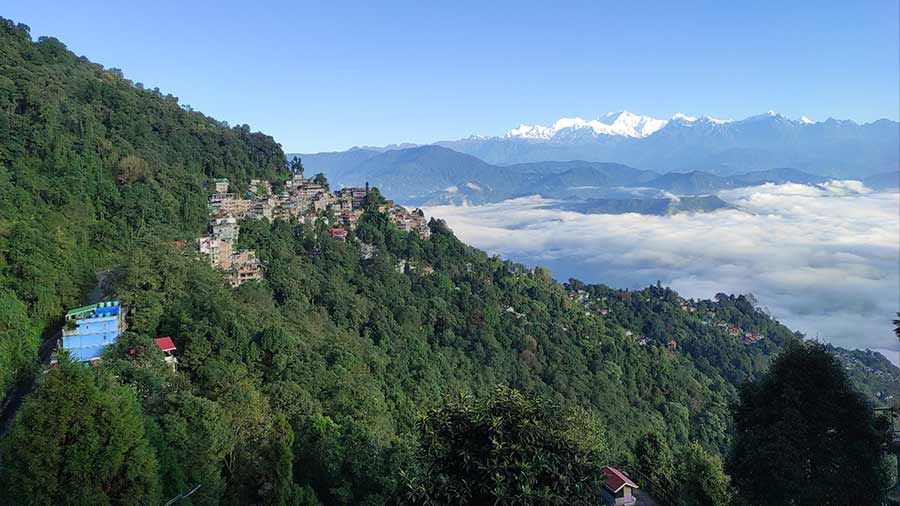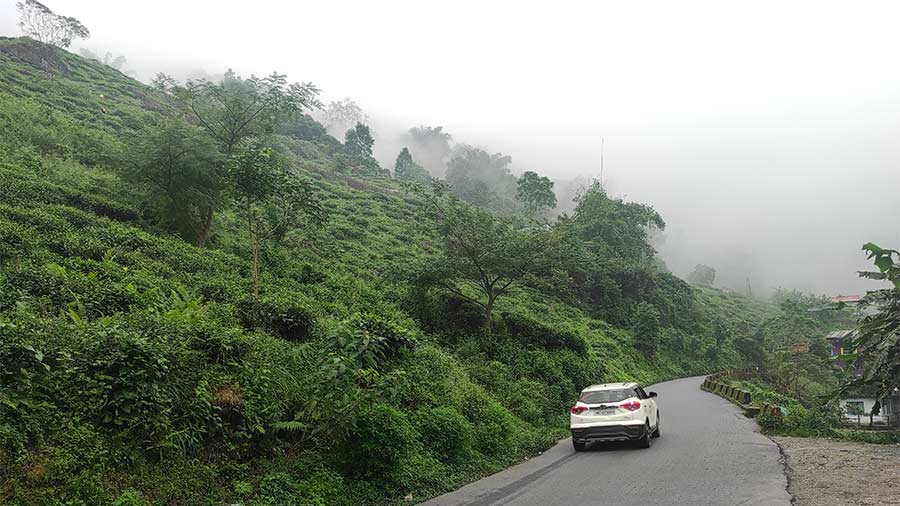(Continued)
Parimal (Bhattacharya) sir helped us find a room at a homestay in Singamari, near his own hotel, away from the hubbubs of Chowk Bazaar that was teeming with both locals and tourists in this peak season. From Bagdogra airport, six of us hired an SUV that crossed the Balason river and Rohini tea garden to connect with the famous Hill Cart Road of Darjeeling. Sir had settled himself in the front seat with my friend and the driver and was merrily retelling his misadventures during the first few months of his job in Darjeeling. Since this was to be my first view of the hills, I was voted to have the back window seat and found myself beside Indrani ma’am typing away at her smartphone so she doesn’t have to pick up yet another tiring work call. Slowly, but with a certain consistency, I began to notice a chill in the air and took out a newly ordered cap with earflaps before rolling up the glass window. I grow old, I grow old — a young Prufrock in Darjeeling. I smirked at my reflection on the glass.
It is a bit funny to count your regrets at the supposed prime of your life, but there is such a thing as the quarter-life crisis in late capitalism. Just ask anyone nearing 30 about their biggest mistakes and even the most workaholic overachieving souls will tell you how they are too late for that one thing they would have excelled at if given another chance to go back. At 50, you see the inevitable shadow of death and look back at what could have been. At 30, you hear the unavoidable snigger of disappointments and look on at what is to come.
“Can you feel it?” Ma’am suddenly gripped my arm, her eyes brimming with excitement as she took a deep breath, her smartphone face down on her lap. Earlier, in the plane, I had asked how close we would be to clouds on the hills and she had said that we would move through them on the way. We were somewhere between Sonada and Senchal now with forests on both sides covering our view. I had indeed felt a thick mist in the air around me coming from the driver’s open window. “How do I know if it’s a cloud or just fog?” She shrugged, “We will have to find an expert. From September, the monsoon ends and the fog disperses for a while. I have always thought of these as clouds.” I shyly moved my hand in the air and took a deep breath as well. Is this how the hills enter your heart? You breathe in a wisp of cloud and let it touch your spirit. I noticed I was smiling to myself. In the mountains, there you feel free. I kept the window rolled down the rest of the way.
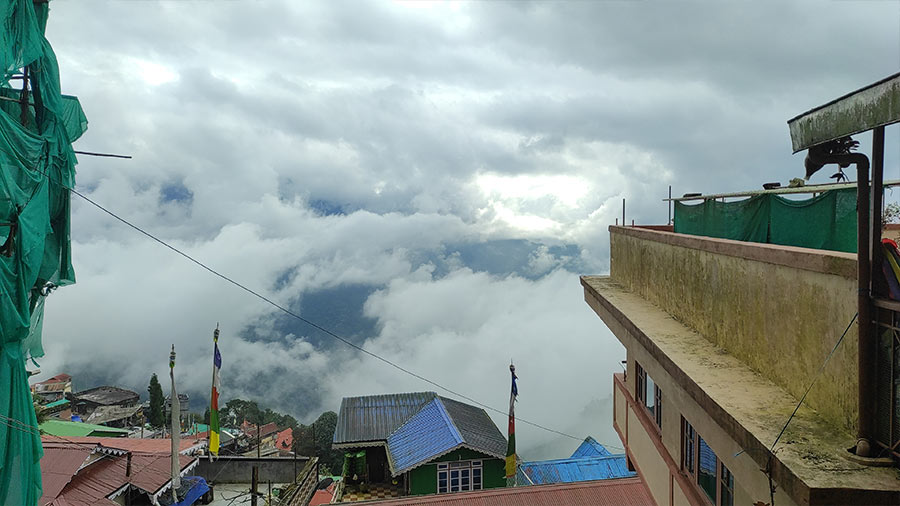
The clouds close in on the town Sagnik Yadaw
We reached Singamari well into the afternoon after a three-and-a-half-hour drive. We had forgotten to order lunch before coming, but the lady at the homestay took pity at the very much audible murmur of six hungry tummies. There was rice and dal and a squash vegetable dish within the hour.
At the wash basin, I saw a small placard with the request “Please use water sparingly”. I remembered how one of my professors who was also posted in Darjeeling had joked to me once that his contribution to tackling the Darjeeling water crisis was to never shower. I had laughed and said I was a born activist when it comes to the water crisis. Despite being a land with one of the highest rainfall in the country, faulty rain-harvesting projects and dependence on old colonial pipeline systems have left the people of Darjeeling with less than half of their daily water requirement. I would later find the same pleas of water conservation pasted on all our bathroom walls. But we personally did not experience any water problems. Like most hotels and well-to-do families, this homestay probably got its water from private water suppliers. Selling water was big business in Darjeeling. Trucks full of liquid life would regularly climb the hills and get pumped in the houses that could afford it, leaving the great unwashed to struggle everyday with the little they were granted by the municipality — a trickle, a drip of life into pots and pans. Clean hands and clean sheets and the burden of ceaseless calculations.
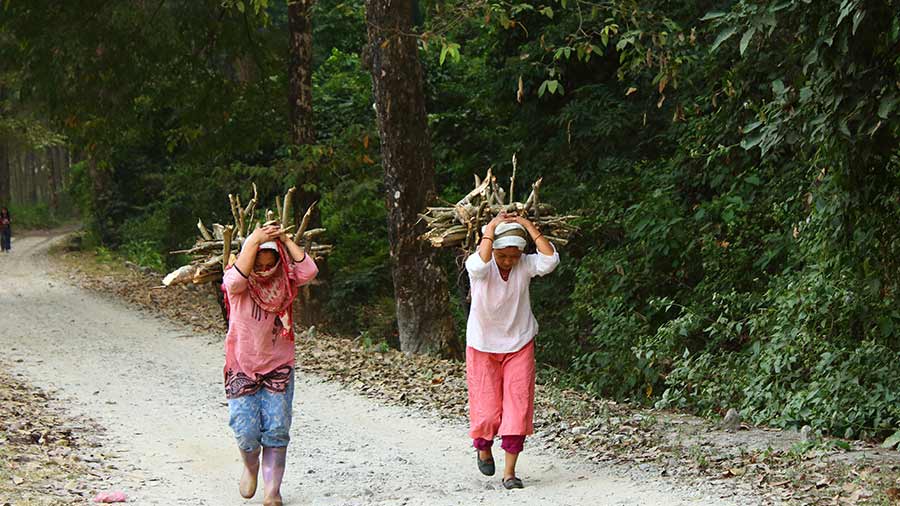
Women carry firewood Sumit Roy
After lunch, my companions decided to visit Mall Road and Chowk bazaar. I had brought my laptop in case the curing would be instant, but the sight of the flat sleek square of unrecyclable plastic peeking from my bag did not yet inspire me into action like my friend had promised. So, I joined the group instead. We reserved a car till Chowk bazaar and walked the rest of the way till Chowrasta, taking a few shortcuts or what the locals call “chor batos” that I had first read about in Sir’s book. Indrani ma’am took the lead, navigating the stream of people like a deft swimmer and making one or two pit stops at the local shops on the way. She also had a mission. The sky god had been kind to us on our first day, but you cannot walk around Darjeeling without an umbrella and my friend had forgotten his back in Kolkata. He was eager to buy the first one he found but Ma’am assured him that she would find a cheaper, more sturdy one on their way. Unfortunately, this was too much pressure for the umbrellas of Chowk bazaar and it soon became apparent that they would not live up to the expectations Ma’am had set for them. Undeterred, she continued her quest until finally Parimal sir intervened and it was decided that my friend could be left at the mercy of the elements for another day. “She has more energy than the rest of us combined,” Sir told me with an affectionate grin later.
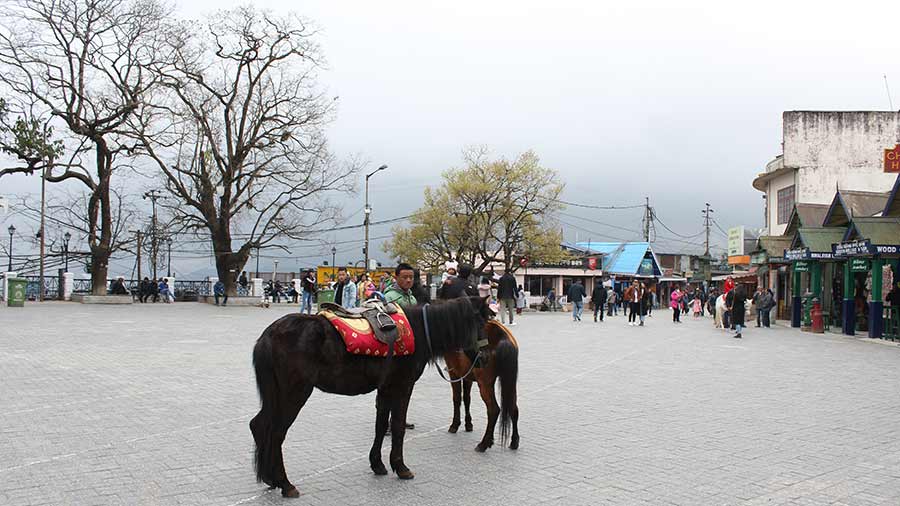
Ponies at Chowrasta Sumit Roy
We reached Chowrasta after a while. A row of benches circled the place with shops behind them that had clothes, curios and books on display. The centre was filled with walkers, hawkers selling knick knacks and a number of ponies with tired eyes dragged by their owners. I remembered a Facebook post from just before Covid by a Darjeeling NGO. An abandoned pony with a bloated stomach was found in front of the Oxford book shop. Locals at first thought she was pregnant. A vet later clarified it to be an infection from swallowing plastic. An online petition to the municipality had followed, one of many over the years, circulated in closed circles of animal welfare workers. Such tapping of signatures, however, never vibrate long enough to burst the filter bubbles of social media. The ponies of Chowrasta, like the horses of Kolkata, trundle on, bearing the heavy burden of a decolonised tourist industry’s colonial fetish. My friend noticed my disgusted gaze at the riders and tried to preoccupy me with the building at the hilltop on our left. “That's the Windamere Hotel. You remember the story of Alexandra David-Néel and the prince of Sikkim from Sir’s book, Bells of Shangri-La? Alexandra had stayed there.”
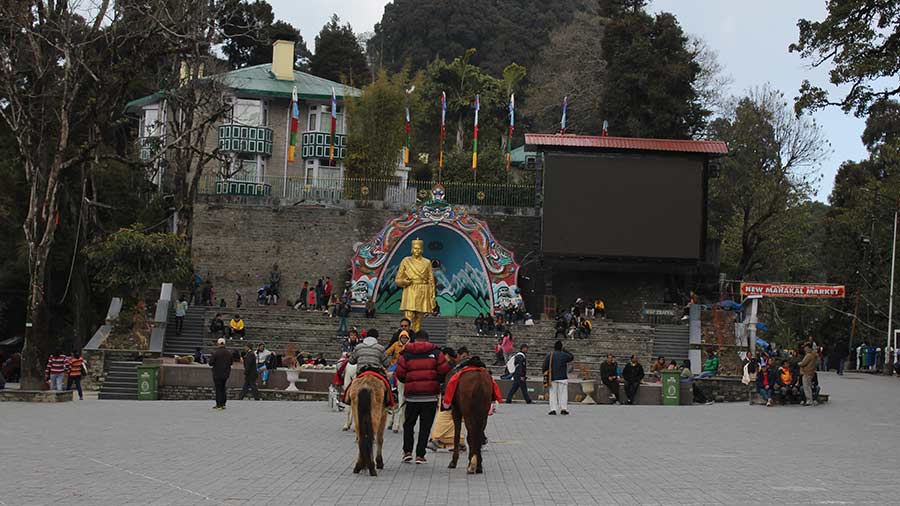
Windamere Hotel, overlooking Chowrasta Sumit Roy
The hotel never caught my eye. Blocking most of it from my angle was a giant screen beside the entrance of the Mahakal market. The screen was lit with some kind of tourism advert flashing the worn-out images of the town — a temple decorated with prayer flags, the face of an East Asian old woman against the backdrop of a winter wear shop, a young woman with similar facial features carrying a basket on her back in a tea garden, a panoramic view of the town with houses on hills that look like toys, the shot of a red panda curiously looking at the camera, the toy train with considerable steam and finally, the snow-capped peak of Kanchenjunga.

Dusk and mist settle in Sagnik Yadaw
“Over there, see!” For a moment, I thought Subhendu-da was also pointing at the hotel. Then we saw it. Just beside the giant screen that showed a snow-capped peak in 4k resolution was a patch of sky that held the actual mighty mountain, partly hidden behind the clouds and looking dull in the dying light of dusk. It seemed the real and the reproduced stand side by side in Darjeeling, one ready to replace the other in hi-definition technicolour. Six of us waited, watching this rare and absurd spectacle. A spot-the-difference puzzle game for the tourists. Finally, the screen changed to something new and we turned back. I couldn’t understand why but I had felt a little shiver at the possibility of actually completing that puzzle. I did not want to come back to Chowrasta anymore.
(To be continued tomorrow)
